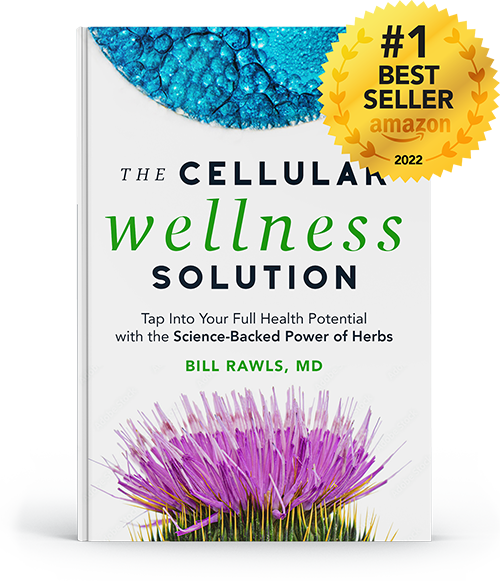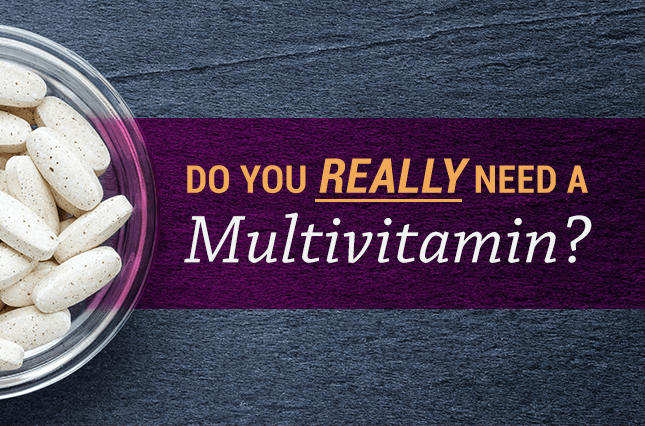I’ve been on the fence as to whether or not to take multivitamins for my whole life. Growing up in the 60s and 70s, there was always a bottle of multivitamins on the breakfast table. Every morning, each person at the table would take their turn. The basic “One A Day” was popular at the time, but chewable products were also making their debut. Flintstones were my favorite — they tasted like candy.
The idea of taking a multivitamin came with America’s shift toward processed food products in the mid-20 century. Fast food was a radical change from freshly prepared meals that had been the norm, but ready-made foods seemed to be a better fit for the fast pace of American life. Not only that, processed foods were specifically designed to appeal to our preferential tastes for carbohydrates and fats. I don’t think anyone thought that these new foods were nearly as nutritious as the freshly prepared foods people had been eating before, but that was okay; multivitamins were there to fill the void.
Both fast foods and multivitamins became the standard that is still with us today. Currently, half of all Americans and 70% of those over 65 take a multivitamin product.
The big question is: does taking a multivitamin really do anything?

Most average “once-daily” multivitamin products contain synthetic forms of vitamins and minerals. These aren’t the same as the forms of vitamins and minerals found in natural whole foods. When someone takes a standard multivitamin, the body has to expend energy to convert these synthetic substances into a form the body can actually use, which seems to defeat the whole purpose.
On top of that, numerous clinical studies failed to show a clear benefit of taking multivitamins for improving health or reducing the incidence of chronic illness and cancer. As recent as 2018, research published in the Journal of the American College of Cardiology reviewed data from 179 individual trials and concluded that multivitamin supplements did not help prevent or improve cardiovascular disease. Another study examined data from more than 30,000 people over six years. It likewise found that people who took multis and other nutrient supplements had about the same risk of dying as those who didn’t take a multivitamin.
That being said, some people still feel more comfortable taking multivitamins just for peace of mind. They believe by taking extra vitamins and minerals, their bases are covered if they don’t always eat healthily or are stressed.
And who isn’t stressed sometimes? Maybe when people are under stress or even as we age, we do need a little extra support.
At different points in my life, I’ve gone back and forth between taking and not taking multivitamins regularly. Growing up, I took them every day. After becoming an adult and shifting to a healthier diet, I felt that multivitamins weren’t as necessary, and I gave them up. Later in middle age, a health crisis precipitated by Lyme disease caused me to rethink a lot of things, including whether to take multivitamins.

I read opinions from experts who felt that the reason why studies consistently failed to show benefit was that they were all using unnatural synthetic forms of vitamins and minerals. They reasoned that if the natural forms of the vitamins, termed bioavailable, were used, the outcomes could have been different.
There’s no doubt that our body burns up a lot more vitamins and minerals when we’re stressed, and I was definitely stressed. Though I was particular about following a healthy diet, I wanted to give my body any advantage it could get. I again decided to take a multivitamin, but this time, not just any multivitamin off the grocery store shelf.
I found a top-quality product that exclusively provided bioavailable forms of essential vitamins and minerals and started taking it regularly. Did I notice any difference? Maybe a little. I certainly couldn’t say it was more than embracing a healthy diet, but it did give me peace of mind. Though I was confident that it wasn’t doing any harm with the doses I was using, it certainly wasn’t a total solution to my ongoing health issues either. Perhaps I needed more than just a multivitamin.
Nourishment vs. Protection
Multivitamin products and herbal products often get lumped together under the category of natural supplements, but they couldn’t be more different. They both have value, but that value is as different as apples and oranges.
To understand the difference, you have to think about the body as a complex collection of living cells. The body contains several trillion cells of about 200 different types. A person’s health is a reflection of the health of the cells that make up that person’s body. If a person’s cells are all healthy and all the cells in the body are functioning in harmony, then that person is the definition of good health.
To function properly, a cell must receive a steady supply of pure water, oxygen, and nutrients. Nutrients, including carbohydrates and fats to generate energy, amino acids to synthesize new proteins, and vitamins and minerals for enzymatic functions, must all be absorbed through the intestinal tract.
Everything that happens inside a cell is a function of enzymes. We need vitamins and minerals because they are key components of enzymes. To function properly, cells need an adequate supply of vitamins and minerals, but having more than the cell can use at one time doesn’t add any benefit. In fact, saturating a cell with excessive vitamins and minerals could even be harmful.

No doubt, the best source of vitamins and minerals is a healthy diet. Still, if a healthy diet isn’t consistent, logic would suggest that supplementing with essential vitamins and minerals could be beneficial. That being said, supplemental vitamins and minerals must be supplied in the form that the body can easily use — dumping unnatural synthetic forms of vitamins in the body is like putting cheap gas into your car; it works, but it’s not the best thing for the engine.
The key takeaway is that bioavailable vitamins and minerals are necessary for normal cellular functions and that greater quantities of vitamins and minerals are required when cells are stressed, but that vitamins and minerals alone do nothing to protect cells from being stressed.
This is where a group of plant chemicals, called phytochemicals, goes above and beyond the benefits offered by multivitamins. Plants produce a spectrum of different types of phytochemicals to protect cells against a wide range of physical, chemical, and biological (insects and microbes) stress factors. When we consume phytochemicals, either from foods or supplements, all those benefits are transferred. When our cells are protected from stress, they function better, burn out slower, and require less in the way of vitamins and minerals.
A few protective phytochemicals have become household words. Resveratrol, a phytochemical found in grapes and wine, is a potent antioxidant known for slowing aging. Resveratrol has also been found to protect mitochondria, the source of energy for cells. Less well known, pterostilbene is a phytochemical with similar properties found in blueberries. Phytochemicals called catechins, found in green tea, slow aging and prevent chronic illness by protecting cells from damaging antioxidants.
Though fruits and vegetables are an important source of protective phytochemicals, our food plants have been cultivated primarily to provide high yields of nutrients, especially carbohydrates. That has come at the expense of protective phytochemicals. This where the plants we define as herbs have a clear advantage.

Herbs are wild plants. Their value isn’t supplying nutrients. If you had to depend on eating herbs as a sole food source, you’d go hungry. Herbs, however, are an excellent source of protective phytochemicals — their true value is protecting cells. The wild plants defined as herbs are plants that humans have selectively been using for thousands of years for both culinary and medicinal purposes.
Adding Herbs for Organ and Cellular Protection
Adding herbs into your life provides a level of protection to your cells unmatched by any food source or multivitamin product. A good place to start is taking a few herbal ingredients along with your multivitamin. Some possible choices that provide exceptional protection for cells of the body against every type of possible stress include:

Trans-resveratrol from Japanese knotweed
Trans-resveratrol, the most bioavailable form of resveratrol, is well-known for offering cardiovascular support and antioxidant properties.

Pine Bark Extract
Potent antioxidants and other chemical compounds in Pine Bark Extract help the body maintain vascular tissue and support the integrity of blood vessels. PBE is also supportive to the immune system.

Milk Thistle Extract
Silymarin, the primary chemical component of milk thistle, offers potent support for the liver; it increases natural antioxidants found in liver cells. It is the most widely researched of all liver-related herbs and is well known for low toxicity and safety.

Hawthorn Leaf Extract
Supports the cardiovascular system, blood flow to the heart, oxygen delivery to tissues, and healthy blood vessels.

Maqui Berry
Maqui Berry is a Patagonian berry that is wild-harvested by the Mapuche people of Chile and Argentina. Their traditional Maqui Berry beverage is credited for contributing to their extraordinary strength and stamina.

Lutein & Zeaxanthin
These twin carotenoid compounds account for the yellow color in vegetables. They build up in the retina of the eye and maintain a healthy retina during normal exposure to sunlight. They also accumulate in the skin to support its health. Prevention Plus contains the same amount of these substances as compared to ocular supplements recommended by ophthalmologists.
Adding Herbs for Stress and Optimal Health
If you’re under stress or want to gain even more protection for your cells, consider adding on some herbs with adaptogenic properties. All herbal traditions recognize herbs with nonspecific properties that can be used daily to invigorate the body and promote longevity. In Traditional Chinese Medicine, they’re called tonics. In Ayurvedic medicine, the traditional medicine of India, they’re referred to as rasayanas. In the second half of the twentieth century, Western science began categorizing these and other herbs as adaptogens.
Herbs that fit the definition of adaptogen have been defined by science to:
- Assist the body in resisting a wide range of physical, chemical, and biological stress factors.
- Have nonspecific actions in the body that do not cause drug-like effects.
- Are non-toxic and do not harm or disrupt normal functions in the body

There are many herbs defined as adaptogens or herbs that complement adaptogens that can be taken daily to protect cells from stress and support optimal health. A few to consider are:
- Rhodiola
- Reishi
- Cordyceps
- Ashwagandha
- Gotu kola
- Turmeric
- Japanese knotweed
- Chinese skullcap
- Shilajit
The Bottom Line
Your cells must have vitamins and minerals to function. A healthy diet is the best source, but admittedly, eating healthy all the time can be challenging. A multivitamin can help fill the void, but bioavailable forms are always the best choice. The limitation of multivitamins must be respected, however; multivitamins have little capacity to protect cells from stress and therefore shouldn’t be expected to reduce risks of chronic illness and cancer.
Herbs have a clear advantage for protecting cells against stress — the spectrum of phytochemicals in herbs protect cells against all types of stress. When cells aren’t stressed, they don’t have to work as hard, use fewer nutrients, and burn out slower.
Why not take both? Why not ensure your cells have a ready supply of bioavailable vitamins and minerals and protect your cells with herbal phytochemicals at the same time? Combining a daily herbal product with bioavailable vitamins and minerals may be the best of all possibilities!

Discover more in Dr. Bill Rawls’ new #1 Bestselling book: The Cellular Wellness Solution: Tap Into Your Full Health Potential with the Science-Backed Power of Herbs.
“An eye-opening and empowering book that the world needs right now: The Cellular Wellness Solution will fundamentally change how you think about herbs and the powerful role they play in cultivating wellness at the cellular level.”


Mark Hyman, MD
Fourteen-time #1 New York Times Bestselling Author
Looking for More Wellness Tips?
Join our newsletter for bi-weekly tools, education, and savings to boost your health.
References
1. Jenkins, DJA et al. “Supplemental Vitamins and Minerals for CVD Prevention and Treatment.” J Am Coll Cardiol. 2018 Jun 5;71(22):2570-2584.
2. Chen, Fan et al. “Association Between Dietary Supplement Use, Nutrient Intake, and Mortality Among US Adults: A Cohort Study.” Ann Intern Med. 2019 May 7; 170(9): 604–613.
3. Harvard Health Publishing, Harvard Medical School. “Vitamins and your heart.” Healthbeat. Retrieved from https://www.health.harvard.edu/heart-health/vitamins-and-your-heart
4. Tapsell, Linda C. et al. “Foods, Nutrients, and Dietary Patterns: Interconnections and Implications for Dietary Guidelines.” Adv Nutr. 2016 May; 7(3): 445–454.
5. Diabetes Prevention Program Research Group. “Reduction in the Incidence of Type 2 Diabetes with Lifestyle Intervention or Metformin.” New England Journal of Medicine. 2002 Feb 7; 346(6): 393–403.
6. Dehghan, Mahshid et al. “Associations of fats and carbohydrate intake with cardiovascular disease and mortality in 18 countries from five continents (PURE): a prospective cohort study.” Lancet. 2017 Nov 4; 390(10107): 2050-2062
7. National Center of Complementary and Integrative Health. “Rhodiola.” Retrieved from https://nccih.nih.gov/health/rhodiola
8. Hewlings, Susan J. and Kalman, Douglas S. “Curcumin: A Review of Its’ Effects on Human Health.” Foods. 2017 Oct; 6(10): 92.
9. Ratan ZA, Youn SH, Kwak YS, et al. Adaptogenic effects of Panax ginseng on modulation of immune functions. J Ginseng Res. 2021;45(1):32-40. doi:10.1016/j.jgr.2020.09.004
10. Liao LY, He YF, Li L, et al. A preliminary review of studies on adaptogens: comparison of their bioactivity in TCM with that of ginseng-like herbs used worldwide. Chin Med. 2018;13:57. Published 2018 Nov 16. doi:10.1186/s13020-018-0214-9
11. Panossian AG, Efferth T, Shikov AN, et al. Evolution of the adaptogenic concept from traditional use to medical systems: Pharmacology of stress- and aging-related diseases. Med Res Rev. 2021;41(1):630-703. doi:10.1002/med.21743



